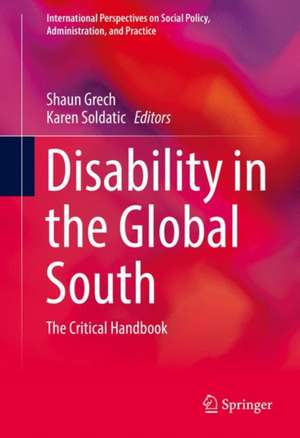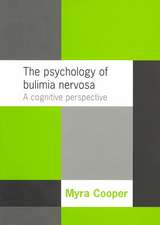Disability in the Global South: The Critical Handbook: International Perspectives on Social Policy, Administration, and Practice
Editat de Shaun Grech, Karen Soldaticen Limba Engleză Paperback – 2 oct 2017
Dispatches from Ghana, Lebanon, Sri Lanka, Cambodia, Venezuela among many others spotlight the complex uncertainties of modern geopolitics of coloniality; emergent forms of governance including neoliberal globalization, war and conflicts; the interstices ofgender, race, ethnicity, space and religion; structural barriers to redistribution and realization of rights; and processes of disability representation. This handbook examines in rigorous depth, established practices and discourses in disability including those on development, rights, policies and practices, opening a space for critical debate on hegemonic and often unquestioned terrains.Highlights of the coverage include:
- Critical issues in conceptualizing disability across cultures, time and space
The UNCRPD, disability rights orientations and instrumentalitie · Redistributive systems including budgeting, cash transfer systems and programming.
· Global South–North partnerships: intercultural methodologies in disability research. This much awaited handbook provides students, academics, practitioners and policymakers with an authoritative framework for critical thinking and debate about disability, while pushing theoretical and practical frontiers in unprecedented ways.
| Toate formatele și edițiile | Preț | Express |
|---|---|---|
| Paperback (1) | 699.41 lei 43-57 zile | |
| Springer International Publishing – 2 oct 2017 | 699.41 lei 43-57 zile | |
| Hardback (1) | 947.61 lei 43-57 zile | |
| Springer International Publishing – 17 noi 2016 | 947.61 lei 43-57 zile |
Din seria International Perspectives on Social Policy, Administration, and Practice
- 15%
 Preț: 630.33 lei
Preț: 630.33 lei - 18%
 Preț: 712.46 lei
Preț: 712.46 lei - 5%
 Preț: 360.26 lei
Preț: 360.26 lei -
 Preț: 385.61 lei
Preț: 385.61 lei -
 Preț: 381.29 lei
Preț: 381.29 lei - 18%
 Preț: 877.44 lei
Preț: 877.44 lei - 15%
 Preț: 575.16 lei
Preț: 575.16 lei - 15%
 Preț: 460.26 lei
Preț: 460.26 lei -
 Preț: 382.79 lei
Preț: 382.79 lei -
 Preț: 380.17 lei
Preț: 380.17 lei - 5%
 Preț: 634.42 lei
Preț: 634.42 lei - 5%
 Preț: 693.90 lei
Preț: 693.90 lei - 24%
 Preț: 722.23 lei
Preț: 722.23 lei - 18%
 Preț: 1089.00 lei
Preț: 1089.00 lei - 18%
 Preț: 1102.68 lei
Preț: 1102.68 lei - 18%
 Preț: 711.85 lei
Preț: 711.85 lei -
 Preț: 378.63 lei
Preț: 378.63 lei -
 Preț: 396.01 lei
Preț: 396.01 lei - 19%
 Preț: 389.36 lei
Preț: 389.36 lei
Preț: 699.41 lei
Preț vechi: 822.83 lei
-15% Nou
Puncte Express: 1049
Preț estimativ în valută:
133.85€ • 139.04$ • 111.18£
133.85€ • 139.04$ • 111.18£
Carte tipărită la comandă
Livrare economică 03-17 februarie 25
Preluare comenzi: 021 569.72.76
Specificații
ISBN-13: 9783319680835
ISBN-10: 3319680838
Pagini: 613
Ilustrații: XXVIII, 613 p. 14 illus.
Dimensiuni: 155 x 235 x 38 mm
Greutate: 0.89 kg
Ediția:1st ed. 2016
Editura: Springer International Publishing
Colecția Springer
Seria International Perspectives on Social Policy, Administration, and Practice
Locul publicării:Cham, Switzerland
ISBN-10: 3319680838
Pagini: 613
Ilustrații: XXVIII, 613 p. 14 illus.
Dimensiuni: 155 x 235 x 38 mm
Greutate: 0.89 kg
Ediția:1st ed. 2016
Editura: Springer International Publishing
Colecția Springer
Seria International Perspectives on Social Policy, Administration, and Practice
Locul publicării:Cham, Switzerland
Cuprins
Introduction: disability in the global south—mapping terrains.- Theoretical Introductions: Globalizing Disability.- Disability and development: historical linkages.- From the MDGs to Post-2015: what place for disability—reflections on inclusive development.- Anthropology, the ethnographic enterprise and disability.- Global health and disability.- Histories of Disability: From the Colonial to the Post-Neocolonial.- From ancient history to colonialism: disability in retrospect.- Colonialism and the disabled body.- From the colonial to the post/neocolonial and contemporary empire.- Globalization and the production of disabled subjects: global-local poverty nexus.- Conceptual and Cult
ural Landscapes.- Counting disabled people: historical perspectives and the troubles of disability statistics.- Conceptualizing disability across cultures and the cultures of disability; from models to hybrid landscapes.- The social model across cultures is it really all the same? Understanding poverty:historical developments and implications for disability.- The global south: imagined, real or both?—beyond the benevolent notion of “development”.- Disability Rights, Legislation, and the Ascent of the Global Disability Movement.- From human to disability rights: historical developments.- The international disability movement and the history of a collective struggle.- The UN Convention on Disability and Disability Rights: a critical evaluation from policy to practice.- The World Report on Disability: a global south focus? .- Socio-cultural and Psychological Terrains in Lands of Poverty.- Disability and poverty: complex interactions.- Chronic poverty, social protection, and disability.- Disability and access to health care and rehabilitation.- Education: critical debates.- Livelihoods and disability.- Disabled people in conflict and wars.- Psycho emotional disablism and the psychological impacts of life in poverty.- Disability and disaster: discourses of vulnerability and resilience.-Intersectionalities.- Disability and gender: beyond Western feminist readings.- Childhood and disability in contexts of poverty.- Disability, race and ethnicity.- Disability and migration: an untold odyssey.- Rurality and the politics of location.- Families and Communities: Collective Struggle and Narratives of Resilience.- Religion, beliefs and disability.- Communities and resistance in contexts of poverty.- From disabled persons to “disabled families”.- Community-Based Rehabilitation: a “new” panacea? .- Disability Research Across Cultures.- Whose knowledge, whose voices? Challenging northern epistemologies.- Decolonizing disability research.- Global disability studies: a new field?
ural Landscapes.- Counting disabled people: historical perspectives and the troubles of disability statistics.- Conceptualizing disability across cultures and the cultures of disability; from models to hybrid landscapes.- The social model across cultures is it really all the same? Understanding poverty:historical developments and implications for disability.- The global south: imagined, real or both?—beyond the benevolent notion of “development”.- Disability Rights, Legislation, and the Ascent of the Global Disability Movement.- From human to disability rights: historical developments.- The international disability movement and the history of a collective struggle.- The UN Convention on Disability and Disability Rights: a critical evaluation from policy to practice.- The World Report on Disability: a global south focus? .- Socio-cultural and Psychological Terrains in Lands of Poverty.- Disability and poverty: complex interactions.- Chronic poverty, social protection, and disability.- Disability and access to health care and rehabilitation.- Education: critical debates.- Livelihoods and disability.- Disabled people in conflict and wars.- Psycho emotional disablism and the psychological impacts of life in poverty.- Disability and disaster: discourses of vulnerability and resilience.-Intersectionalities.- Disability and gender: beyond Western feminist readings.- Childhood and disability in contexts of poverty.- Disability, race and ethnicity.- Disability and migration: an untold odyssey.- Rurality and the politics of location.- Families and Communities: Collective Struggle and Narratives of Resilience.- Religion, beliefs and disability.- Communities and resistance in contexts of poverty.- From disabled persons to “disabled families”.- Community-Based Rehabilitation: a “new” panacea? .- Disability Research Across Cultures.- Whose knowledge, whose voices? Challenging northern epistemologies.- Decolonizing disability research.- Global disability studies: a new field?
Notă biografică
Shaun Grech (Phd) is Director of The Critical Institute and Global Disability Watch. He is also Visiting Fellow at Manchester Metropolitan University and editor-in-chief of the international journal Disability & the Global South.
Karen Soldatic (PhD) is an Australian Research Council DECRA Fellow (2016–2019), Institute of Culture and Society, Western Sydney University. She is the Head of Research, Global Disability Watch, and Affiliate Fellow at The Critical Institute, Malta and Centre for Disability Research, Policy and Practice, University of Colombo, Sri Lanka.
Karen Soldatic (PhD) is an Australian Research Council DECRA Fellow (2016–2019), Institute of Culture and Society, Western Sydney University. She is the Head of Research, Global Disability Watch, and Affiliate Fellow at The Critical Institute, Malta and Centre for Disability Research, Policy and Practice, University of Colombo, Sri Lanka.
Textul de pe ultima copertă
This first-of-its kind volume spans the breadth of disability research and practice specifically focusing on the global South. Established and emerging scholars alongside advocates adopt a critical and interdisciplinary stance to probe, challenge and shift common held social understandings of disability in established discourses, epistemologies and practices, including those in prominent areas such as global health, disability studies and international development. Motivated by decolonizing approaches, contributors carefully weave the lived and embodied experiences of disabled people, families and communities through contextual, cultural, spatial, racial, economic, identity and geopolitical complexities and heterogeneities.
Dispatches from Ghana, Lebanon, Sri Lanka, Cambodia, Venezuela among many others spotlight the complex uncertainties of modern geopolitics of coloniality; emergent forms of governance including neoliberal globalization, war and conflicts; the interstices of gender, race, ethnicity, space and religion; structural barriers to redistribution and realization of rights; and processes of disability representation. This handbook examines in rigorous depth, established practices and discourses in disability including those on development, rights, policies and practices, opening a space for critical debate on hegemonic and often unquestioned terrains.Highlights of the coverage include: Disability, poverty and livelihoods in urban and rural contexts Disability interstices with migration, race, ethnicity, gender a nd sexuality Disability, religion and customary societies and practice
·
The UNCRPD, disability rights orientations and instrumentalitie · Redistributive systems including budgeting, cash transfer systems and programming.
· Global South–North partnerships: intercultural methodologies in disability research. This much awaited handbook provides students, academics, practitioners and policymakers with an authoritative framework for critical thinking and debate about disability, while pushing theoretical and practical frontiers in unprecedented ways.
Dispatches from Ghana, Lebanon, Sri Lanka, Cambodia, Venezuela among many others spotlight the complex uncertainties of modern geopolitics of coloniality; emergent forms of governance including neoliberal globalization, war and conflicts; the interstices of gender, race, ethnicity, space and religion; structural barriers to redistribution and realization of rights; and processes of disability representation. This handbook examines in rigorous depth, established practices and discourses in disability including those on development, rights, policies and practices, opening a space for critical debate on hegemonic and often unquestioned terrains.Highlights of the coverage include:
- Critical issues in conceptualizing disability across cultures, time and space
The UNCRPD, disability rights orientations and instrumentalitie · Redistributive systems including budgeting, cash transfer systems and programming.
· Global South–North partnerships: intercultural methodologies in disability research. This much awaited handbook provides students, academics, practitioners and policymakers with an authoritative framework for critical thinking and debate about disability, while pushing theoretical and practical frontiers in unprecedented ways.
Caracteristici
Draws together leading local southern disability theorists and northern theorists to highlight discussion, debate, and research on the topic Generates new theoretical paradigms through provision of rich, critically engaged chapters Includes narratives and voices providing accessible and relevant vignettes Provides an unprecedented focus on disability in rural areas and among indigenous populations Includes supplementary material: sn.pub/extras

















